Why Airbnb owners are about to Sell
By Nick Gerli | Posted on June 23, 2023Many Airbnb owners will soon be forced to sell their properties, resulting in a housing bust that could be on par with the 2008 Subprime Crisis in some cities.
These Airbnb owners are getting ready to sell because of "Airbnb bust", a downturn in the short-term rental market that started in the second half of 2022, with Airbnb operators in some cities facing a 50% decline in revenue. These declining revenues are the result of a slowdown in post-pandemic travel demand to go along with a massive increase in Airbnb supply, trends which are now causing many Airbnb operators to lose money on their rental.
I believe these losses will cause a wave of distressed selling from Airbnb operators in 2023 and 2024, particularly in cities where:
1) revenue has crashed the most, and
2) Airbnb supply increased the most
If you're a homebuyer or real estate investor it's important to understand the exposure your city and neighborhood has to the Airbnb crash, particularly the timing and depth of the downturn. Because when it all shakes out, I believe that there will be some great buying opportunities for homebuyers and investors across the real estate spectrum.
So, without further ado, let's dive into the data.
(Note that when I refer to "Airbnb" in this article, I am referring to the broader short-term rental market, which includes listings found on Airbnb, VRBO, Booking.com, and other travel sites.)
65% more Airbnbs than Homes for Sale in 2023
But before getting into the city-specific data, it's important to understand the broader national trends. Most notably, that the number of Airbnb rentals in America has skyrocketed from less than 200,000 seven years ago to nearly 1 million in 2023 according to data from AllTheRooms.
At the same time, the number of homes Listed For Sale has plummeted, dropping from roughly 1.2 million prior to the pandemic to less than 600,000 today according to data from Realtor.com. The result is that there are currently 65% more homes listed for rent on Airbnb than listed For Sale.
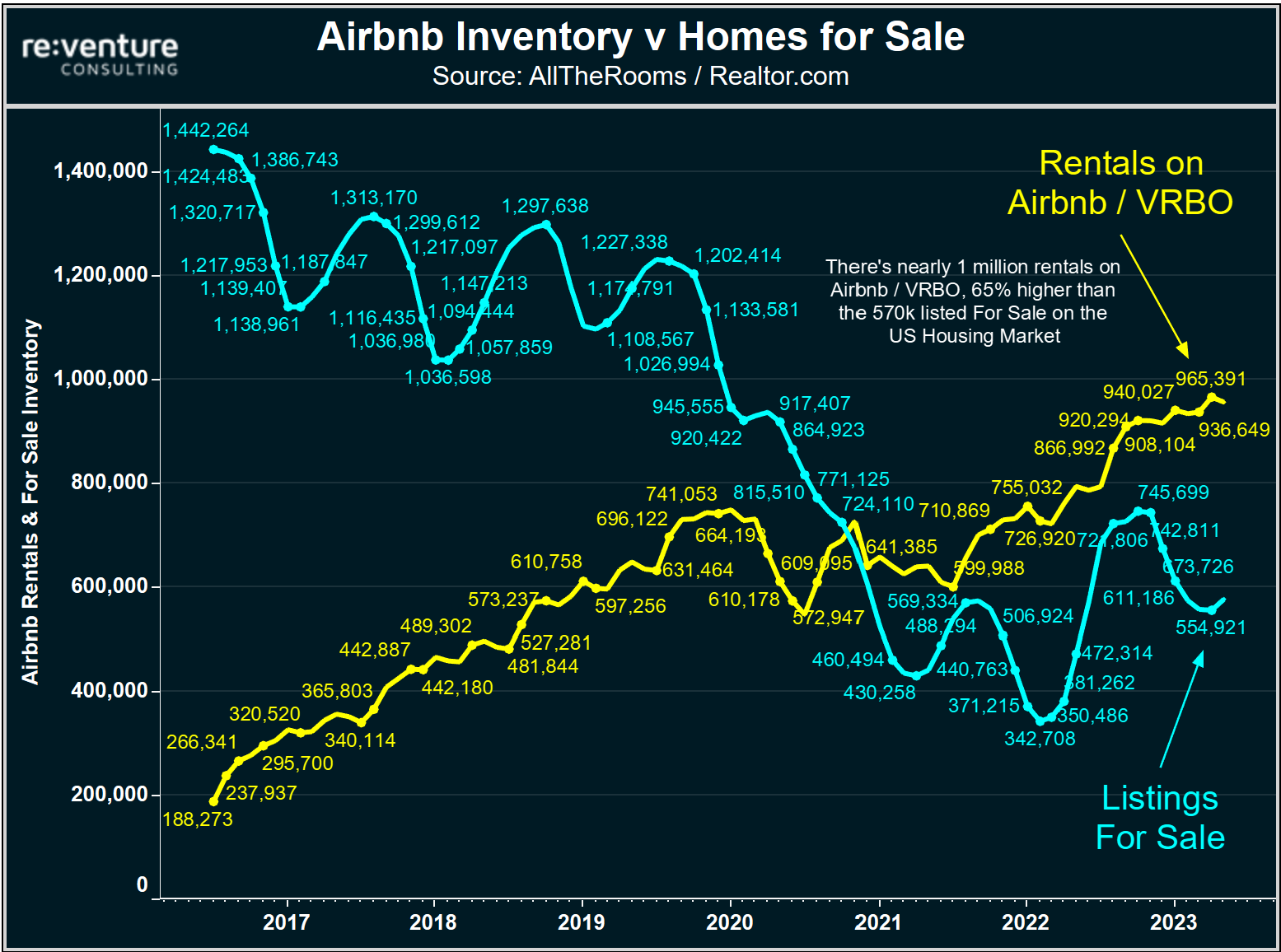
The rise in Airbnb rentals was caused by 1) investors buying up houses to rent out short-term and 2) existing homeowners deciding to list their houses on Airbnb instead of selling them. A double whammy, one-two punch that has sucked inventory out of the US Housing Market.
50% Crash in Airbnb Revenue reported in some Cities
But there are now signs that this trend of increased Airbnb listings might be coming to an end as the market reaches saturation in 2023, with Airbnb's CEO warning of a "booking slowdown". At the same time, vacation rental management companies reported a 13% drop in revenue per property in the first quarter of 2023.
Clearly, something is up, with the deluge of Airbnb supply over the last several years now intersecting with a recessionary slowdown in travel demand. A cocktail which is leading to a collapse in revenue for Airbnb operators across America.
The collapse is most notable in the Southwest and Mountain West areas of the country, where Airbnb revenue per listing is down 40-50% YoY. With owners in cities such as Austin, Phoenix, Denver, and San Antonio taking the hardest hit according to data from AllTheRooms.
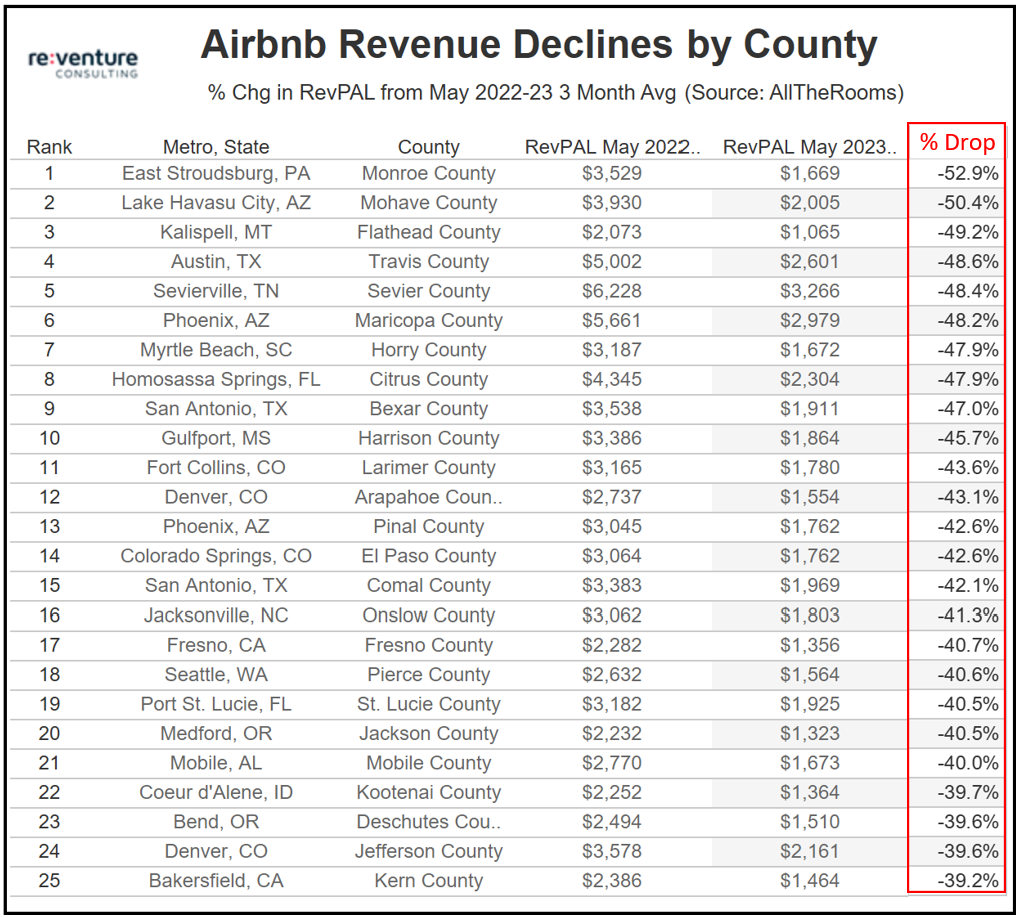
But the declines weren't isolated to these areas. Of the 182 counties in America with the most short-term rental listings, revenues were down in 179 of them (98%), with the average county experiencing a 29% decline in revenue per listing comparing the three-month period from March to May 2023 to the previous year.
Phoenix is ground zero for Airbnb Bust
The epicenter of Airbnb bust is undoubtedly Phoenix, AZ, a market that is now plagued with a huge glut of short-term rental supply, with the number of Airbnb rentals in Maricopa County increasing by 500% over the last seven years.
Much of that listing growth has come in the last 15 months, as a downturn in the Phoenix housing market pushed many owners to list their properties on Airbnb instead of selling them. The result was that Airbnb supply increased from 10,000 in early 2022 to nearly 18,000 today.
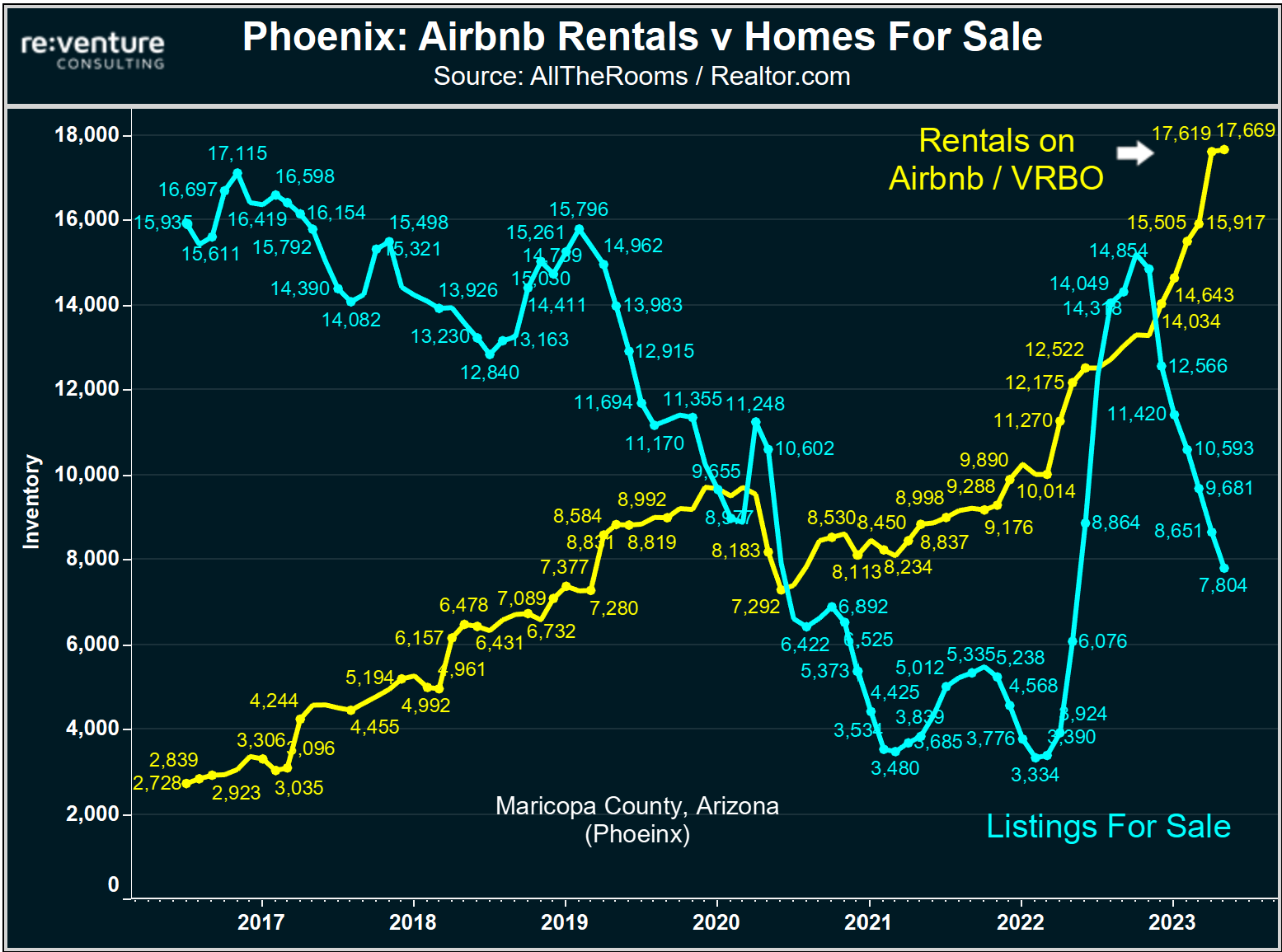
At the same time, For Sale listings on the Phoenix housing market have plummeted, dropping from an average of 14,000 prior to the pandemic to 7,800 in May 2023.
This has caused the short-term rental Supply Ratio in Phoenix, a metric calculated by dividing Airbnb listings in by homes For Sale. The resulting ratio in Phoenix is 2.3x, which indicates there are 2.3 listings on Airbnb for every 1 house listed for sale.
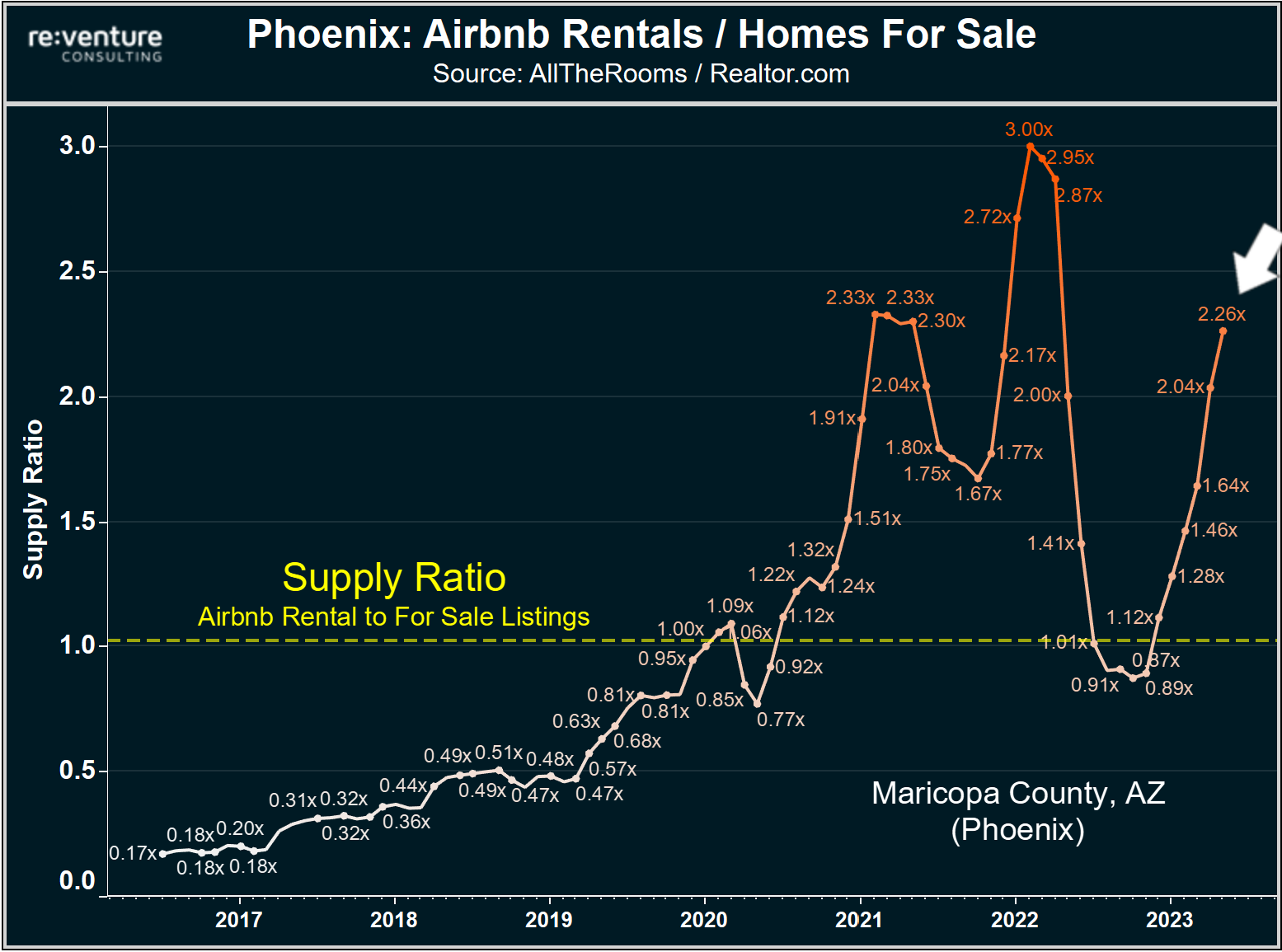
The historical Supply Ratio in Maricopa County is much lower at 1.0x, reinforcing the notion that the area's Airbnb market is oversupplied while its For Sale market is undersupplied. A situation that will likely correct itself in coming years as struggling Airbnb owners elect to sell their properties.
In some cities, this correction could be on par with the Subprime Crisis in terms of how much inventory hits the market. Particularly in an area like Sevierville, a vacation destination in East Tennessee, where the number of Airbnbs currently outnumbers the homes For Sale by 10 to 1!
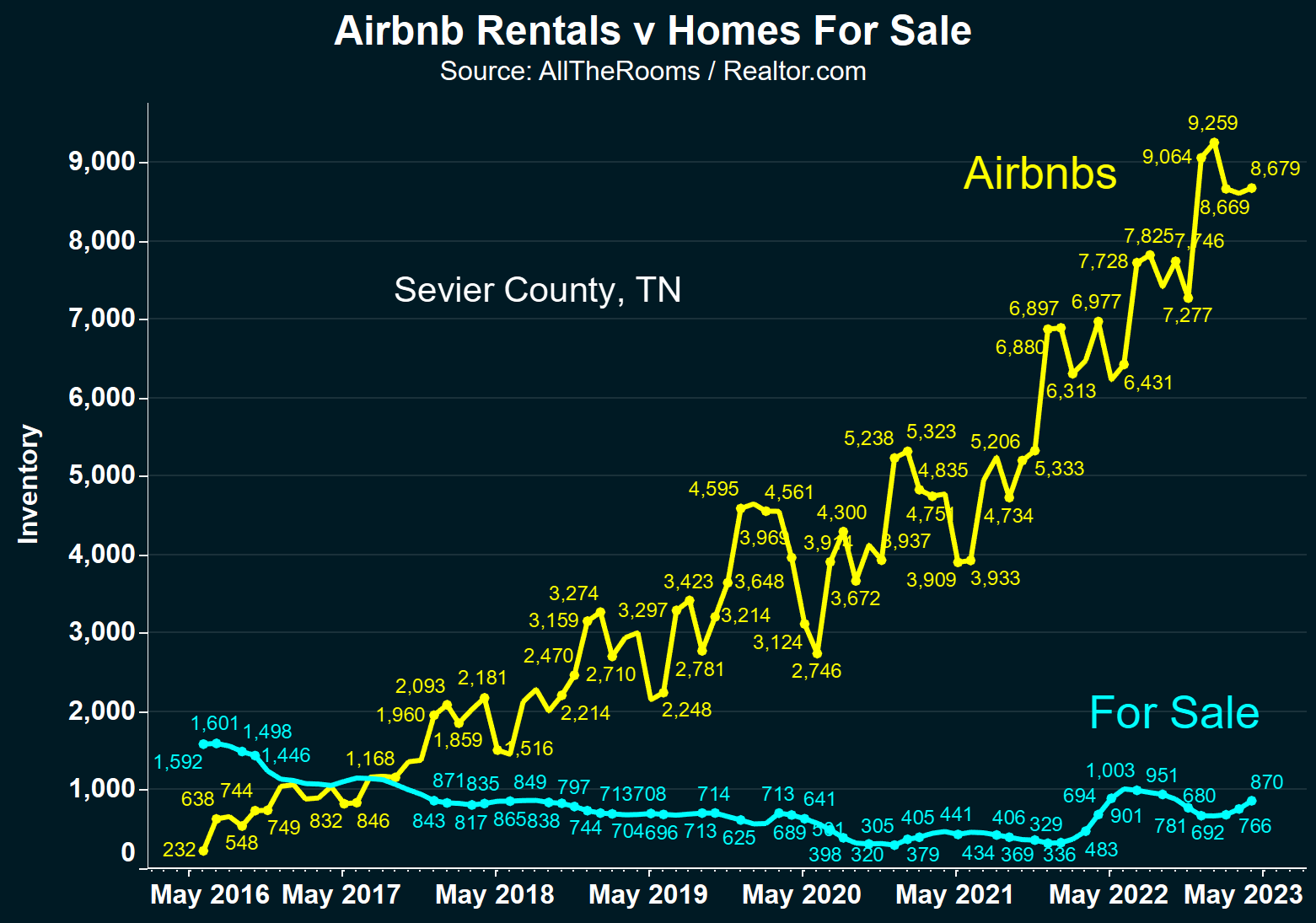
How does this 10:1 Airbnb Supply Ratio in Sevierville play out in the coming months and years as the Recession worsens and travel demand drops further? No one knows for sure. But a scenario where For Sale inventory doubles or triples in a short period of time is entirely possible.
The Airbnb selloff will happen in urban Neighborhoods. And Vacation Destinations.
The oncoming Airbnb bust in America will be primarily felt in two types of locations:
1) dense, urban areas that have the most Airbnb inventory in big cities, and
2) vacation destinations.
You can get a sense of this urban-area exposure in big cities by looking at the Airbnb heatmap below from AllTheRooms, which shows that Phoenix Airbnbs cluster in four main pockets: 1) Downtown Phoenix, 2) Scottsdale, 3) Paradise Valley, and 4) Tempe.
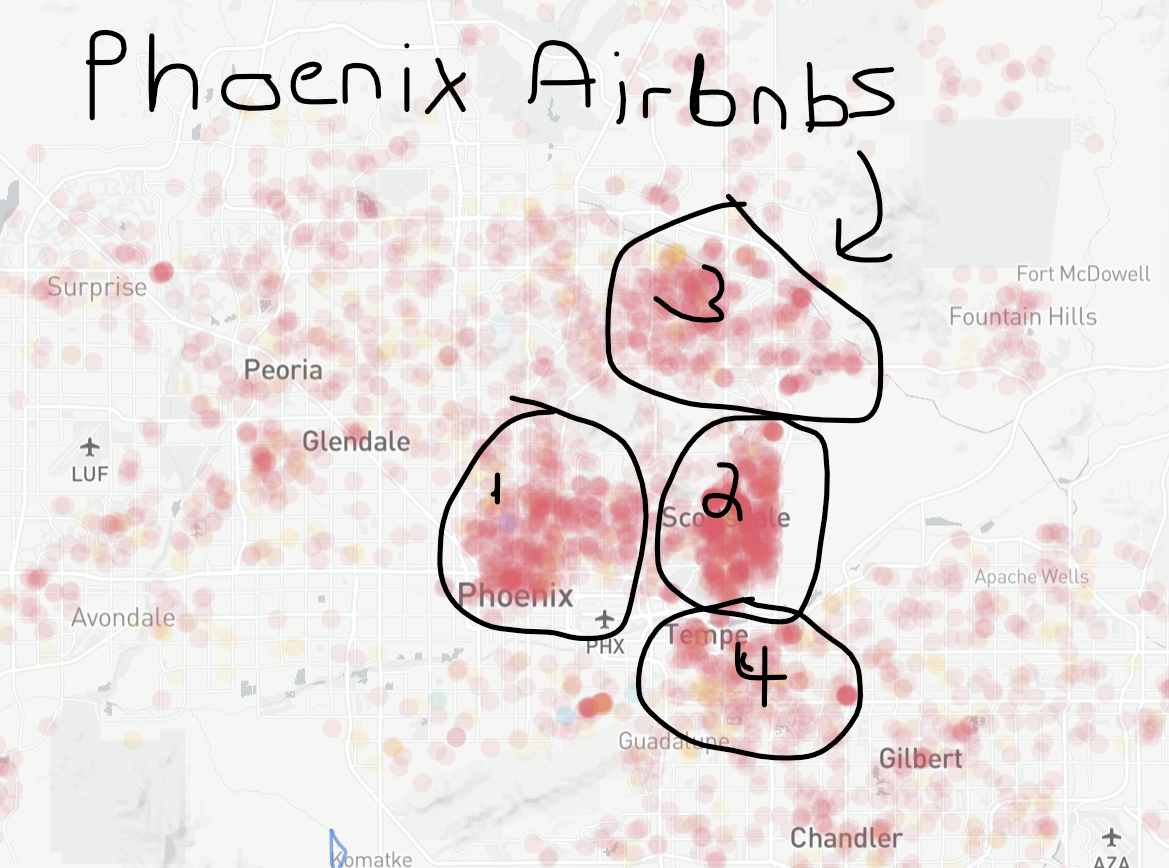
These four areas account for roughly 65% of the short-term rental inventory in Maricopa County, and thus will be the most negatively impacted from an Airbnb owner selloff. Meanwhile, outlying suburban and rural neighborhoods will be less impacted since they have a much lower share of Airbnb inventory.
You can get an even better sense of this by looking at the short-term rental Supply Ratio across a metro like Austin, TX, another area that's been hard-hit by Airbnb bust. In Travis County, which is the main urban county in Austin, there are nearly 9,200 rentals on Airbnb compared to 4,000 listings For Sale, good for a hefty 2.3x supply ratio.

But in Williamson County, the suburban area to the north of Austin, the situation is flipped and there are more homes listed for sale. With the implication being that the Airbnb bust is going to hit the urban Travis County much harder than suburban Williamson County.
However, the more rural one goes, especially to vacation destinations, the more Airbnbs begin to pop-up once again. Nearby Fredericksburg, TX, located about two hours west of Austin, has a Supply Ratio of 6.3x, indicating that there are over 6 Airbnb Listings for every one house for sale. Highlighting the potential for big price declines as Airbnb bust worsens.
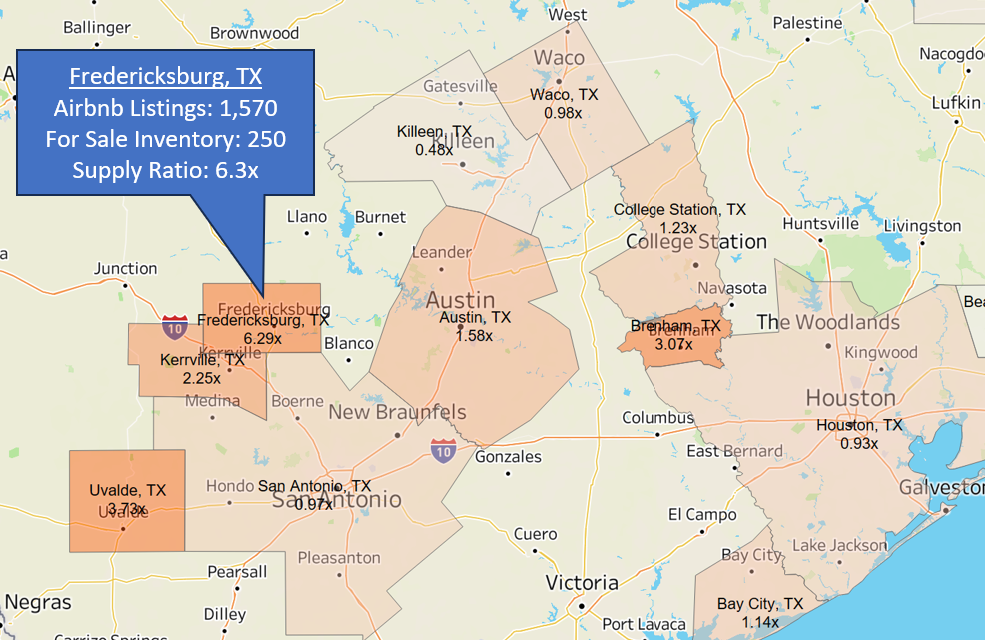
Expect to see more For Rent signs as well
Of course - an Airbnb owner that runs into financial distress might not have to sell. Instead, they could decide to rent out their property long-term, a trend that I suspect is already happening given the flood of rental inventory that has hit the market over the last year.
For instance, in a metro like Nashville, TN, a fairly big Airbnb market, the number of vacant apartment rentals has recently skyrocketed, nearly doubling over the last 15 months all the way up to an 8.0% vacancy rate. This surge in apartment vacancies is similarly echoed in Airbnb-heavy metros like Dallas, Phoenix, Las Vegas, and Tampa.
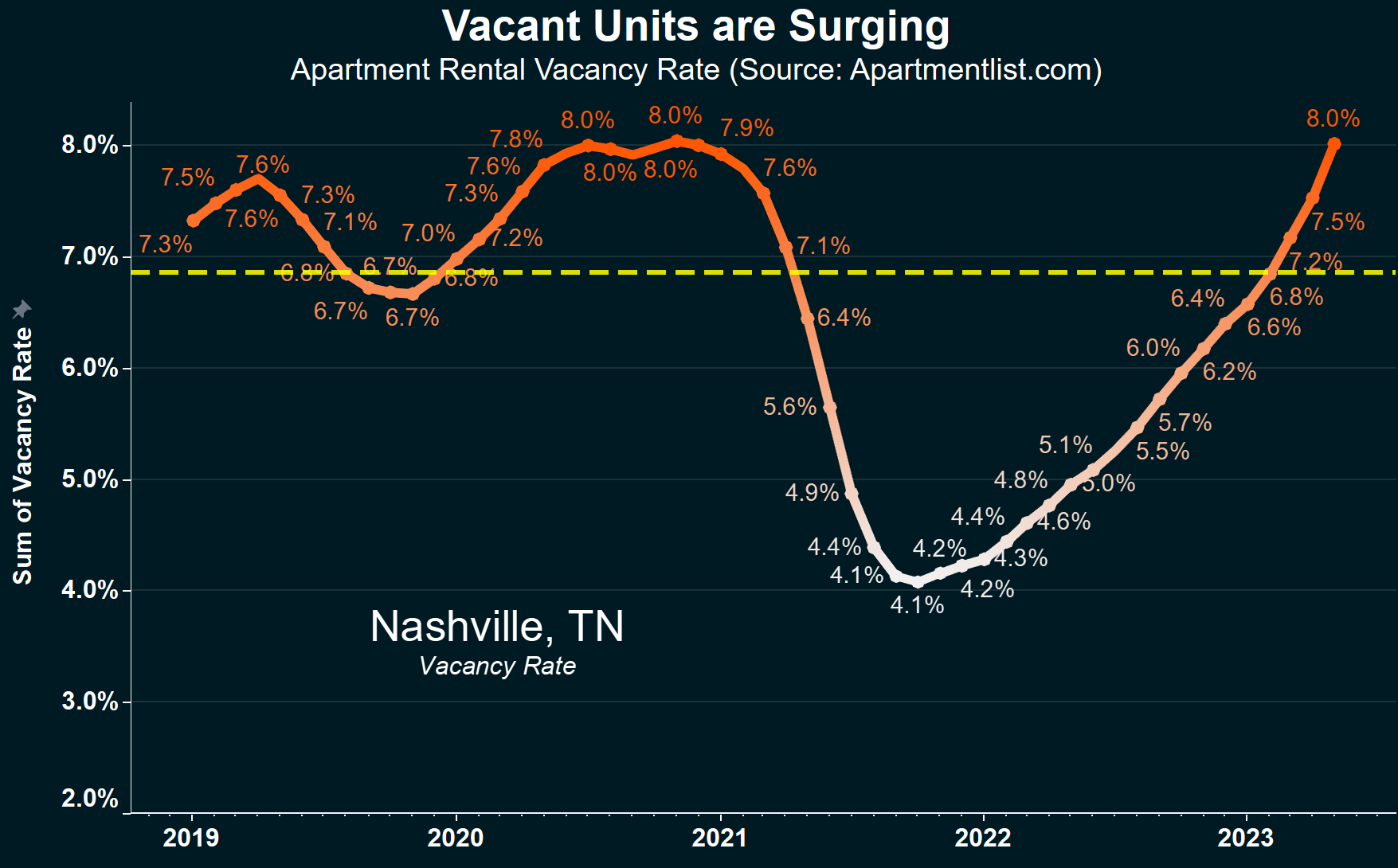
Meanwhile, the number of vacant houses for rent has also skyrocketed in the same period, increasing from 43,000 houses available across America's 54 largest counties in March 2022 to nearly 80,000 today (meaning that the number of vacant houses for rent has nearly doubled in the last year).
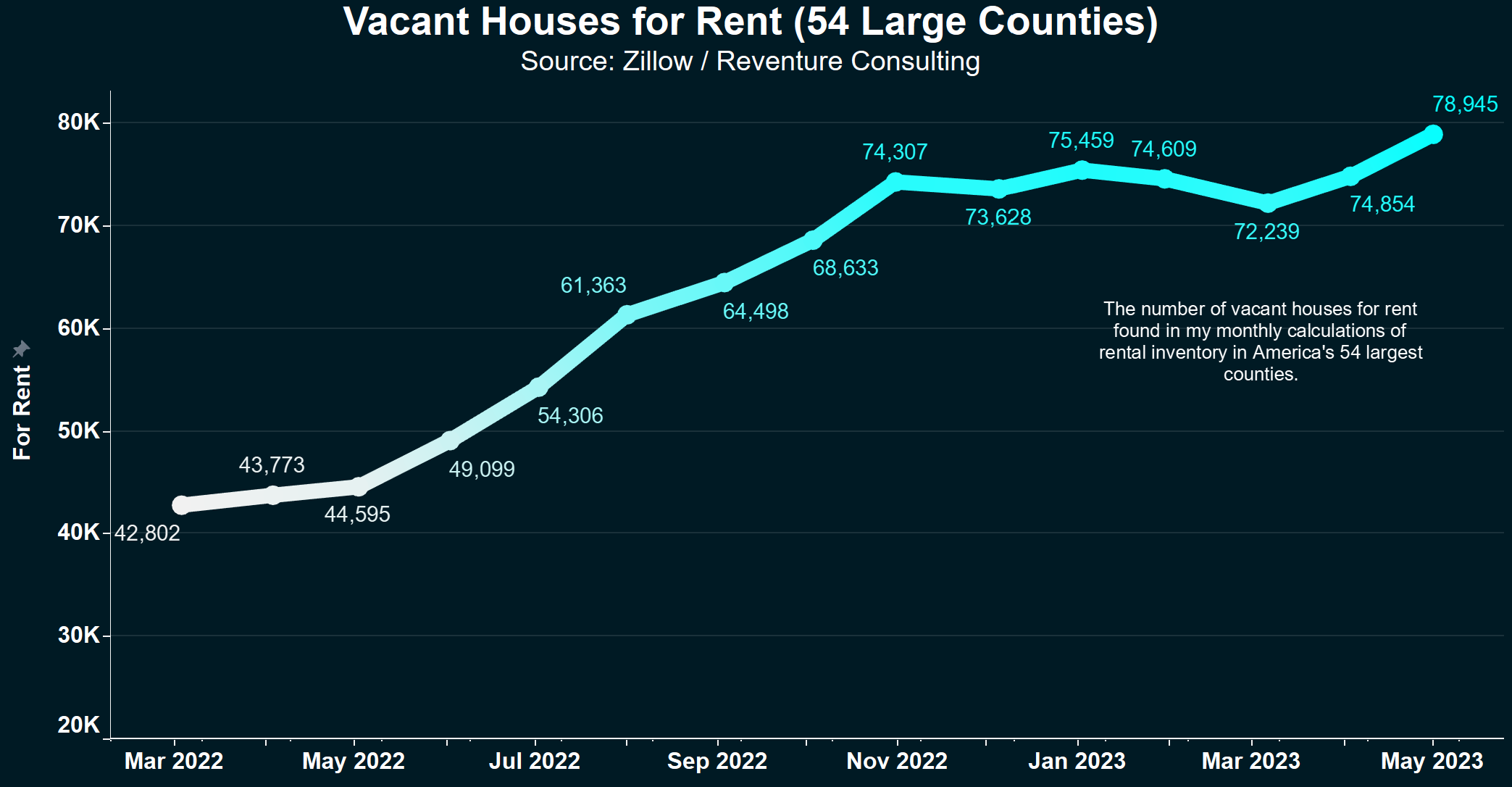
But what if this surge in rental inventory worsens in coming months as more Airbnb operators try out the long-term rental market? Well, it could provide a shock that many institutional landlords are not expecting.
In a place like Maricopa County in Phoenix, roughly 59% of the Airbnb supply is comprised of houses according to AllTheRooms. That compares to 13% condos, 9% apartments, and 20% of guesthouses/other.
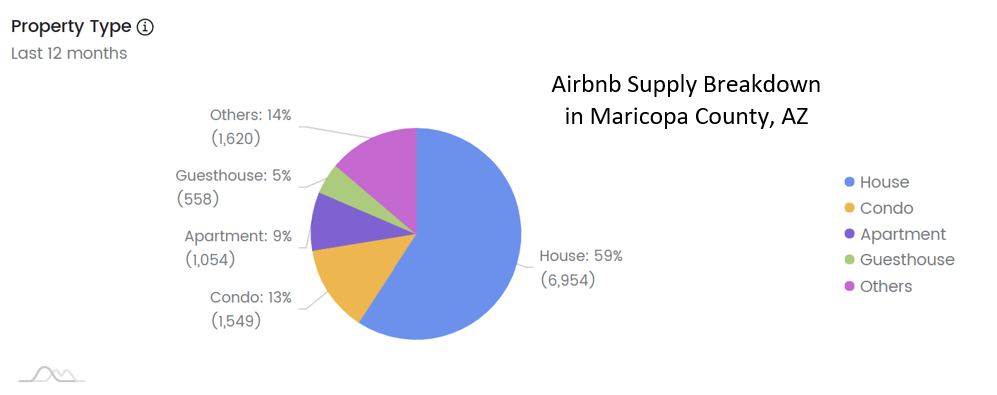
Indicating that biggest surge in rental inventory from Airbnb bust in Phoenix would likely come in the form of houses hitting the market for rent in neighborhoods like Downtown, Scottsdale, Paradise Valley, and Tempe. Such a big surge in rental inventory in such a concentrated area has the potential to cause a massive drop in rents.
Cities where Airbnbs are Performing Better
It's also important to remember that real estate is local, and that not every city or neighborhood is getting hit by Airbnb bust. In fact, some parts of America are experiencing increased Airbnb demand over the last year even as the broader market tanks.
One of these areas is Washington DC, where gross Airbnb revenues are still up 1.6% YoY, while revenue per listing is only down -6%. The reason that DC is holding up better is because there has been a return to big cities over the last year since the pandemic ended, increasing demand for short-term stays. Moreover, Washington DC never got hit with the same surge in Airbnb supply as other cities, with its number of operating Airbnbs today about 15% lower than in 2019.
Another area to watch is Milwaukee, WI. Gross market revenues are up 5.2% YoY while revenue per listing is only down -15% (much better than the -50% in an area like Phoenix). Milwaukee's main draw is a lack of Airbnb supply competition, with the market being the rare case where the number of homes for sale is higher than the Airbnb listings.
Of course, Airbnb investors in 2023 needs to be very careful, because I suspect we are just at the start of Airbnb bust. Over the next year we will likely see more layoffs and a higher unemployment rate in America, which will weigh further on travel demand and profits.
Airbnb bust creates opportunity for Homebuyers and Investors
Finally, I'd like to conclude with some perspective. I believe that Airbnb bust is a positive trend that will help to rebalance the real estate market and provide fresh opportunity to a new batch of homebuyers and investors in 2023 and 2024.
Once the current level of Airbnb supply starts to drop, that should correlate with an increase in both For Sale and For Rent inventory that pushes home prices and rents down further. Enabling homebuyers and long-term real estate investors who have been waiting on the sidelines to re-enter the market.
At the same time, once the Airbnb supply drops enough, it will stabilize the short-term rental market and eventually cause revenues to start going back up. Which will inevitably create fresh opportunity for aspiring Airbnb investors, particularly in hard-hit markets.
The depth and timing of the downturn, and the resulting opportunity created by the downturn, really depends on the city you're in as well as your specific neigborhood. Is your area oversupplied in terms of Airbnbs? If so, by how much? Are revenues dropping? Those are worthwhile questions for homebuyers and investors to figure out the answers to in 2023.
Data in this Post / YouTube Video
The data in this post came from two principal sources:
1) Data on Airbnb revenues and supply comes from AllTheRooms, a short-term rental data tracking service.
2) Data on For Sale Inventory comes from Realtor.com. This data can also be found on Reventure App.
Also stay tuned for a YouTube video on this topic coming later today. You won't want to miss it.
-Nick